初中英语常见动词ing和动词不定式词组
初中英语 动词ing,动词不定式及动词原形
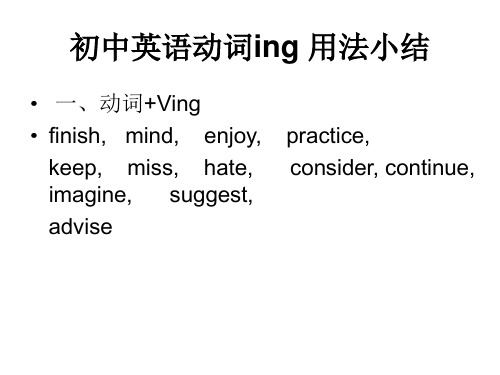
• start/begin doing sth start/begin to do • like doing sth. like doing sth. • 动词ing在句中作主语和表语。 1.Seeing is believing. 2. Eating too much is bad for your health. 3. My job is teaching you English..
固定结构中用Ving
• have some problems(difficulty,trouble) doing sth 他在说英语这方面有困难。 He has difficulties speaking English. • spend…doing sth • be busy doing 他忙于网聊呢。 He is busy chatting on line. • prevent sb from doing sth 阻止某人做某事 他老妈不准他周末出去。 His mother prevents him from going out on weekends.
• can’t help (to) do不能帮助做某事; can’t help doing禁不住做某事。 • stop doing 停止做某事 stop to do 停下来去做某事 • See /hear /watch /notice do sth看见/听见/ 注意到某人常做某事或看见某人做了某事 See /hear /watch /notice doing sth看见/听 见/注意到某人正做某事
• succeed in doing 成功做某事 • 他成功地做了个蛋糕。 • He succeed in making a cake. • How/What about doing sth • instead of doing sth 而不是做某事 他没回家而是去他阿姨家了。 Instead of going home, he went to his aunt’s. • pay attention to doing 集中注意做某事 他集中全部注意力追女孩子。 He pay full attention to chasing girls. • prefer doing to doi+Ving • finish, mind, enjoy, keep, miss, hate, continue, imagine, advise
初中英语常考的动词+动词-ing和动词不定式的总结
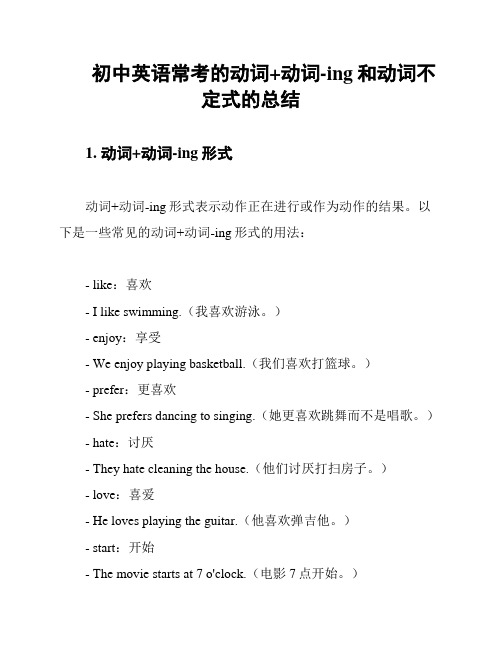
初中英语常考的动词+动词-ing和动词不定式的总结1. 动词+动词-ing形式动词+动词-ing形式表示动作正在进行或作为动作的结果。
以下是一些常见的动词+动词-ing形式的用法:- like:喜欢- I like swimming.(我喜欢游泳。
)- enjoy:享受- We enjoy playing basketball.(我们喜欢打篮球。
)- prefer:更喜欢- She prefers dancing to singing.(她更喜欢跳舞而不是唱歌。
)- hate:讨厌- They hate cleaning the house.(他们讨厌打扫房子。
)- love:喜爱- He loves playing the guitar.(他喜欢弹吉他。
)- start:开始- The movie starts at 7 o'clock.(电影7点开始。
)- finish:完成- They finished cooking dinner.(他们完成了晚饭的烹饪。
)- keep:继续- Please keep talking.(请继续讲话。
)- continue:继续- The rain continued falling.(雨一直在下。
)- stop:停止- He stopped playing the piano.(他停止弹钢琴。
)- avoid:避免- We should avoid making mistakes.(我们应该避免犯错误。
)2. 动词+动词不定式形式动词+动词不定式形式通常表示一个动作的目的、意图或计划。
以下是一些常见的动词+动词不定式形式的用法:- want:想要- decide:决定- They decided to go on a trip.(他们决定去旅行。
)- plan:计划- She plans to study abroad.(她计划出国留学。
)- hope:希望- try:尝试- He tried to solve the math problem.(他尝试解决数学问题。
非谓语动词:to动词原形动词原形ing,英语语言最爱的表达形式

非谓语动词:to动词原形动词原形ing,英语语言最爱的表达形式一、【非谓语动词】:表示动作或者动词词组,不做谓语。
今天主讲非谓语动词形式:to + 动词动词原形,动词原形+ing (V-ing)。
1.动词不定式:由to+动词原形构成。
可以做主语,宾语,定语,表语和状语。
(1)做主语To get there by bikewill take us an hour.解析:译文:骑自行车到达那里将会需要1个小时。
非谓语动词不定式词组做主语:toget there by bike谓语:will take宾语1:us(直接宾语)宾语2:an hour(间接宾语)(2)做宾语The driver failed to see the car in time.解析:译文:这个司机没有及时看到这个小轿车。
主语:The driver谓语:failed宾语:to see the car (非谓语不定式词组做宾语)状语(时间):in time(3)宾补We believe him to be guilty.解析:译文:我们相信他是无罪的。
主语:We谓语:believe宾语:him宾补:to beguilty(对宾语的补充说明)(4) 定语The next train to arrive is from Seoul.解析:译文:马上即将到达的列车是来自首尔的。
主语:The next train谓语:is from宾语:Seoul定语:to arrive(定语是修饰主语的,这里to arrive “即将到达”,修饰 thenext train“下一趟列车”)(5) 表语My suggestion is to put offthe meeting.解析:译文:我的建议是推迟这次会议。
主语:My suggestion谓语:is宾语:themeeting表语:to put off(主系表,在is后面为表语)(7) 状语I come here only to say goodbye to you.解析:译文:我来到这只想跟你告别。
动词不定式和ing的用法
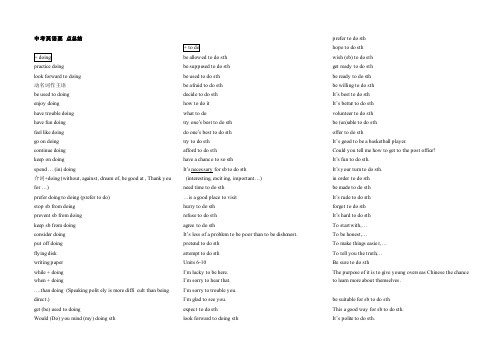
中考英语要点总结+ doingpracti ce doinglook forwar d to doing动名词作主语be used to doingenjoydoinghave troubl e doinghave fun doingfeel like doinggo on doingcontin ue doingkeep on doingspend…(in) doing介词+doing(withou t, agains t, dreamof, be good at, Thankyou for…)prefer doingto doing(prefer to do)stop sb from doingpreven t sb from doingkeep sb from doingconsid er doingput off doingflying diskwritin g paperwhile+ doingwhen + doing….than doing(Speaki ng polite ly is more diffic ult than beingdirect.)get (be) used to doingWould(Do) you mind (my) doingsth + to dobe allowe d to do sthbe suppos ed to do sthbe used to do sthbe afraid to do sthdecide to do sthhow to do itwhat to dotryone’sbesttodosthdoone’sbesttodosthtry to do sthafford to do sthhave a chance to so sthIt’snecess ary for sb to do sth(intere sting, exciti ng, import ant…)need time to do sth…isagoodplaceto visithurryto do sthrefuse to do sthagreeto do sthIt’slessofaproble m to be poor than to be dishon est.preten d to do sthattemp t to do sthUnits6-10I’mluckyto be here.I’msorryto hear that.I’msorryto troubl e you.I’mgladtoseeyou.expect to do sthlook forwar d to doingsthprefer to do sthhope to do sthwish (sb) to do sthget readyto do sthbe readyto do sthbe willin g to do sthIt’sbesttodosthIt’sbetter to do sthvolunt eer to do sthbe (un)able to do sthofferto do sthIt’sgoodtobeabasket ballplayer.Couldyou tell me how to get to the post office?It’sfuntodosth.It’syourturntodosth.in orderto do sthbe made to do sthIt’srudetodosthforget to do sthIt’shardtodosthTo startwith,…To be honest,…To make things easier,…To tell you the truth,…Be sure to do sthThe purpos e of it is to give youngoverse as Chines e the chanceto learnmore aboutthemse lves.be suitab le for sb to do sthThis a good way for sb to do sth.It’spolite to do sth.+ do情态动词+ do sthwouldratherdo…thando…Wouldyou please do sth?make sb do sthlet sb do sthhave sb do sth(have sth done)+ 过去分词(v-ed)1. have my hair cutget my ears pierce dmake himsel f unders toodmake himsel f heard2. This is the boy namedLi Ming.The boy is namedLi Ming.3. —What’reonshow,doyouknow?—Some photos ____ by an Africa n man.A. takenB. are taken4. He joined“Animal s Friend s”——an organi zatio n ______ tohelp homele ss animal s.A. was set upB. setted upC. set up辨析1. used to do sthbe used to doingsthbe used to do sthbe used for doingsth2. have been tohave gone tohave been in 3. frustr ating frustr atedexciti ng excite dsurpri sing surpri sedamazin g amazedboring boredintere sting intere stedterrif ying terrif iedmoving movedtiring tiredscary scared4. be strict withBe strict in5. stop to dostop doing6. So do we.So we do.Neithe r do we.Neithe r we do.7. die dead death dying8.What….!How…!9. 表示推测may bemust becan’tbe10. be full ofbe filled withfill…with…11. may beMaybe12. too muchmuch too13.so…Such14. becaus ebecaus e of15. haveTherebe16. throug hacrosscross17. alread yyet18. cost, take, spend, pay19. speak, talk, say. Tell20. one daysome day21. pastpass (passed)22. in ordertoin orderthat…23. instea dinstea d of ...24. so thatso…that…25. inafter26. besidebeside sexcept。
动词ing形式、过去分词和不定式的区别
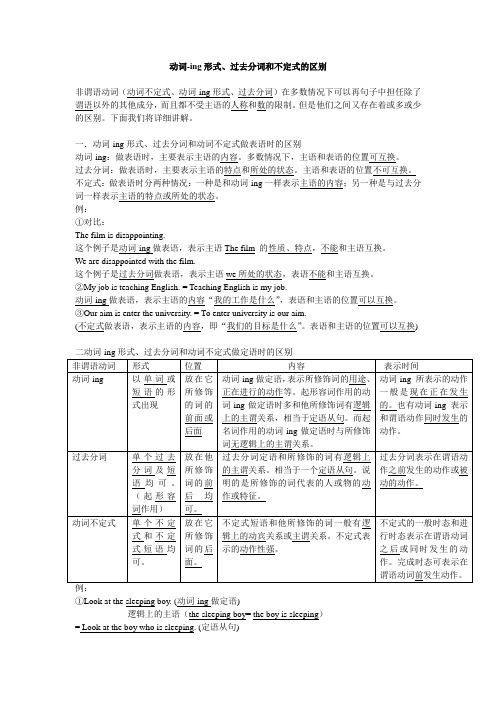
动词-ing形式、过去分词和不定式的区别非谓语动词(动词不定式、动词-ing形式、过去分词)在多数情况下可以再句子中担任除了谓语以外的其他成分,而且都不受主语的人称和数的限制。
但是他们之间又存在着或多或少的区别。
下面我们将详细讲解。
一.动词-ing形式、过去分词和动词不定式做表语时的区别动词-ing:做表语时,主要表示主语的内容。
多数情况下,主语和表语的位置可互换。
过去分词:做表语时,主要表示主语的特点和所处的状态。
主语和表语的位置不可互换。
不定式:做表语时分两种情况:一种是和动词-ing一样表示主语的内容;另一种是与过去分词一样表示主语的特点或所处的状态。
例:①对比:The film is disappointing.这个例子是动词-ing做表语,表示主语The film 的性质、特点,不能和主语互换。
We are disappointed with the film.这个例子是过去分词做表语,表示主语we所处的状态,表语不能和主语互换。
②My job is teaching English. = Teaching English is my job.动词-ing做表语,表示主语的内容“我的工作是什么”,表语和主语的位置可以互换。
③Our aim is enter the university. = To enter university is our aim.(不定式做表语,表示主语的内容,即“我们的目标是什么”。
表语和主语的位置可以互换)例:①Look at the sleeping boy. (动词-ing做定语)逻辑上的主语(the sleeping boy= the boy is sleeping)= Look at the boy who is sleeping. (定语从句)②Please go to the sleeping car. (动词-ing做定语)说明用途(the car is for sleeping)说明:动词-ing做定语Sleeping car : 1) 只有sleeping 重读2)不能变为定语从句3) 两者没有逻辑上的主谓关系③I have a lot of words to say. (不定式做定语)与words存在逻辑上的动宾关系(to say 是不定式的一般式,表示的动作和谓语动作同时发生)说明:不定式做定语words to say 1) to say 只能放在words后面。
初中三年全部英语动词+doing和+to do 句型全汇总
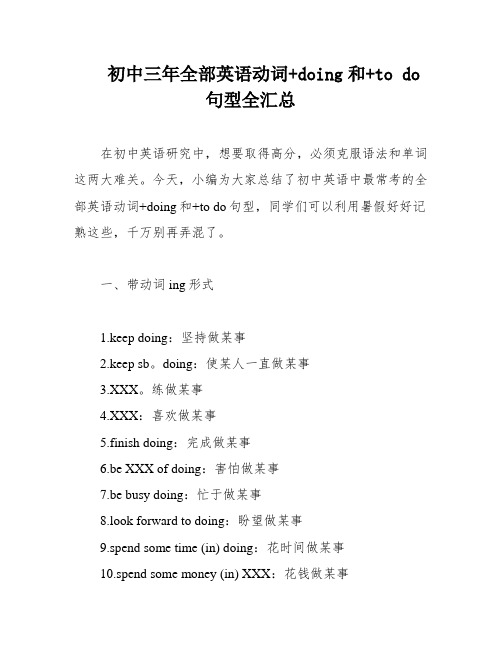
初中三年全部英语动词+doing和+to do句型全汇总在初中英语研究中,想要取得高分,必须克服语法和单词这两大难关。
今天,小编为大家总结了初中英语中最常考的全部英语动词+doing和+to do句型,同学们可以利用暑假好好记熟这些,千万别再弄混了。
一、带动词ing形式1.keep doing:坚持做某事2.keep sb。
doing:使某人一直做某事3.XXX。
练做某事4.XXX:喜欢做某事5.finish doing:完成做某事6.be XXX of doing:害怕做某事7.be busy doing:忙于做某事8.look forward to doing:盼望做某事9.spend some time (in) doing:花时间做某事10.spend some money (in) XXX:花钱做某事11.XXX:想做某事XXX:阻止某人做某事13.thanks sb。
for doing:感谢某人做某事14.thanks for doing:感谢做某事15.do XXX:做点饭、打扫一下卫生、读点书、逛逛街、洗洗衣服16.go XXX:去游泳、钓鱼、逛街、滑冰、划船17.XXX:介意做某事18.can't help doing:情不自禁做某事19.consider doing:考虑做某事20.have fun XXX。
做某事有趣21.XXX。
做某事有困难22.waste time/money doing:浪费时间或金钱做某事23.instead of doing:代替做某事24.miss doing:错过做某事25.hold on to doing:坚持做某事26.pay n to doing:集中精力做某事27.XXX:建议做某事28.现在是该做某事的时候了。
29.有人正在做某事。
30.惯做某事。
31.被用来做某事。
32.拥有丰富的做某事经验。
33.允许做某事。
34.推迟做某事。
最新中考英语必考后接动词ing的动词和词组集锦

最新中考英语必考后接动词ing的动词和词组集锦1. enjoy doing sth.喜欢做某事2. mind doing sth 介意做某事would/will you mind doing sth.你介意做某事吗?3.finish doing sth完成做某事4.practice doing sth.练习做某事5.be busy doing /with sth.忙于做某事6.look forward to doing sth.盼望做某事7. have fun doing sth.做某事有趣9. be worth doing sth 值得做某事10. spend…(in) doing sth./on sth.花费11. Stop doing sth.停止做某事stop to do sth停止去做后面的事情stop/keep sb.from doing sth阻止某人去做某事12. 介词+v-ing 如:what about/do well in/ be good at /thank you for/be interested in+doing sth.13. miss doing sth.错过做某事14. feel like doing sth.想要做某事15. see/hear/watch sb doing/do sth16.keep sb doing sth.让某人保持做某事Keep/stop sb from doing sth阻止某人做某事Keep sb. +形容词/副词/名词/介词17. be used to doing sth.习惯做某事hate to do/doing sth 讨厌/不喜欢做某事have problem doing sth. 做某事遇到困难18. make a contribution to sth/doing sth为某事做出自己的贡献19. give up doing sth 放弃做某事=stop doing sth.20. prefer doing sth to doing sth宁愿做某事而不愿做另一件事=prefer to do sth rather than do sth. prefer to do sth.更喜欢做某事prefer ①sth to ②sth喜欢①某物更胜②某物注意prefer=like…better21. There is a man waiting for you outside.有…正做They have many best bands playing the lastest musics. Lincoln passed laws freeing the slaves. There are some things to see and do.22. have trouble/problem doing sth.做某事有困难Have the trouble to do sth不辞劳苦做某事Be in trouble 处于困境get into touble惹上麻烦23. have a success in doing sth成功做某事。
动词ing形式大全--初中阶段
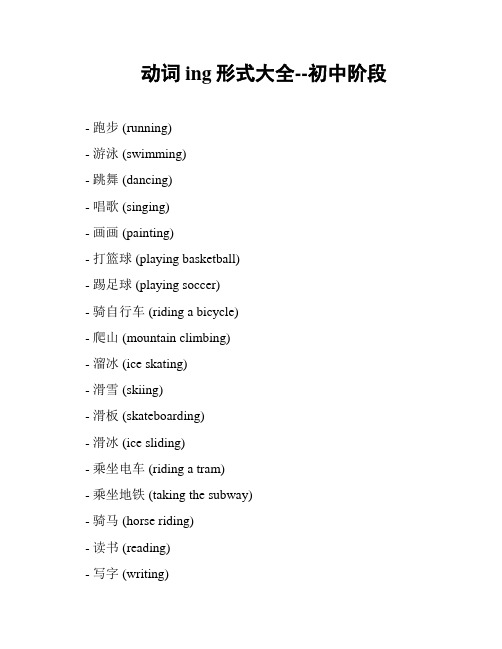
动词ing形式大全--初中阶段- 跑步 (running)- 游泳 (swimming)- 跳舞 (dancing)- 唱歌 (singing)- 画画 (painting)- 打篮球 (playing basketball)- 踢足球 (playing soccer)- 骑自行车 (riding a bicycle)- 爬山 (mountain climbing)- 溜冰 (ice skating)- 滑雪 (skiing)- 滑板 (skateboarding)- 滑冰 (ice sliding)- 乘坐电车 (riding a tram)- 乘坐地铁 (taking the subway)- 骑马 (horse riding)- 读书 (reading)- 写字 (writing)- 看电影 (watching movies)- 看电视 (watching TV)- 看报纸 (reading newspapers)- 看杂志 (reading magazines)- 听音乐 (listening to music)- 听广播 (listening to the radio)- 听故事 (listening to stories)- 研究 (studying)- 上课 (attending class)- 做作业 (doing homework)- 练 (practicing)- 演奏乐器 (playing musical instruments) - 野餐 (having a picnic)- 打游戏 (playing games)- 逛街 (shopping)- 吃饭 (eating)- 喝水 (drinking water)- 吃零食 (eating snacks)- 睡觉 (sleeping)- 说话 (talking)- 听讲座 (attending lectures)- 写博客 (writing blogs)- 旅游 (traveling)- 照相 (taking photos)- 拍照片 (taking pictures)- 做家务 (doing household chores) - 看望亲戚 (visiting relatives)- 看望朋友 (visiting friends)- 聊天 (chatting)。
- 1、下载文档前请自行甄别文档内容的完整性,平台不提供额外的编辑、内容补充、找答案等附加服务。
- 2、"仅部分预览"的文档,不可在线预览部分如存在完整性等问题,可反馈申请退款(可完整预览的文档不适用该条件!)。
- 3、如文档侵犯您的权益,请联系客服反馈,我们会尽快为您处理(人工客服工作时间:9:00-18:30)。
初中英语常见动词ing和动词不定式词组初中英语阅读教学案例郑庄中学原丽随着中考英语的改革,阅读在中考中的分值增大,阅读理解的选材越来越广泛,包括天文、科技、地理、历史、任务传记、英美风俗人情等,并且加大了对考生理解、概括、推理能力的考查。
学生在掌握科学、有效的阅读方法和技巧的同时,使用词典、语法等工具书及各种英语教育教学资源的过程中,能掌握全文大意并能根据中文信息找出问题相关答案,逐步提高学生独立阅读的能力。
现行初中阅读课文是各单元教学的核心,容量大、密度高、话题广、课时紧,需要采取一种新的教学途径来解决。
新的课程标准也提倡任务型的教学途径。
任务型教学就是以具体的任务为学习目的,让学生带着任务完成阅读,理清文路,最终完成阅读题。
一、初中英语阅读能力的要求分析2010年中考题型,整套题加大了阅读量:一篇完形填空,四篇阅读文章,一篇任务型阅读。
六篇文章55分,两个小时内完成这么多文章,还有20分的听力,5分补全对话,15分作文,15分单项选择。
显而易见,阅读的重要性是不可忽视的。
而学生的阅读能力不是一朝一夕能提高的,特别是初中学生需要我们在日常教学中加大对阅读的训练,使学生逐步获得独立阅读能力。
二、操作措施以下Travels for the environment 为例,对阅读技能训练在教学中的应用加以说明,这篇文章内容含量大,设计到热门话题,人口与环境,所以我把这篇文章放在初中英语后讲,在此之前学生在学习中已谈论到了环保的话题。
我在处理这篇文章时,主要有以下几步:阅读前任务设计1、用多媒体播放,人多车多造成的交通道路拥挤,城市的大面积扩张造成了大面积耕地被占用,森林面积减少,然后提出如下问题Who causes such changes?What should we do?学生马上热烈的讨论起来,屏幕上的场景迅速激活了课堂,激发了学生的阅读兴趣,使他们产生了强烈的阅读愿望。
阅读中任务1、快速阅读,了解主旨大意使学生在规定时间内默读完课文并找出每段的主题句或段落的中心句。
当然,学生也可以用不同的句子来概括每段的中心。
只要有自己的观点,都要给予肯定和表扬。
2、精读,获取更多信息为了帮助学生了解更多的信息,设计如下几个问题,让学生在问中找出相关信息,并小组讨论1)From the passage we know that our earth has changed much because of --------- A.its old age’s activities changes of weather natural development 2)Water pollution will become even worse if --------- . and fish continue to die continue to built factories can’t stop factories from sending waste things into water riversand lakes are still dead 3.研读,从中受到启发阅读后任务通过前面几个环节的教学,学生对课文的信息有了全面的了解和理解,为了让他们成功运用所掌握的语言形式,阅读后再找出几篇相关话题的文章,做快速阅读训练,让学生先看题再看文章,将文中的答案找出。
1)在日常阅读训练中,让学生能习惯于先审题,掌握题意,带着任务去读文章的方法,一般的阅读问题都可以通过全文找出相关答案或信息,不能让学生单独脱离文章靠印象做题。
2)有的学生表现出不愿合作或不主动,只顾自己思考,基本上在独立学习的层次上,没有真正的讨论和合作;有的学生表现出对任务不理解;有的学生在交流中过多使用母语等。
3)部分学生习惯于教师以前的讲授教学方式,认为上课认真听讲笔记就能学好英语。
开始他们对语言活动表现得漠不关心,在合作学习中合作不主动、不充分,存有消极、自私、依赖和缺乏责任感等不良心理,使合作学习达不到理想的效果。
finish doing sth.完成做某事⑵practice doing sth 练习做某事⑶be worth doing sth 值得做某事⑷be busy doing sth忙于做某事⑸keep doing sth始终/一直做… ⑹be used to doing sth习惯做某事⑺give up doing sth 放弃做某事⑻consider doing sth考虑做某事⑼suggest doing sth建议做某事⑽can’t help doing sth情不自禁做某事⑾feel like doing sth想要做某事⑿enjoy doing sth喜欢做某事⒀miss doing sth思念做某事⒁mind doing sth介意做某事⒂prefer doing sth to doing sth更喜欢做某事⒃look forward to doing sth 期望做某事⒄have a hard / good time (in) doing sth 愉快地做某事⒅spend … (in) doing sth ⒆have trouble/ difficulty/ hard (in) doing sth费力地做某事⒇have fun (in) doing sth. (21)go swimming/ fishing/ camping/ trekking/ hiking/ shopping (22)do some reading/ cleaning/writing/ listening (23)begin/ start to do sth.与doing sth love/ like/ hate to do sth 与doing sth remember/ forget to do sth 与doing sth try to do sth 尽力干某事与doing sth试着干某事stop to do sth 停下来干某事与doing sth.停止干某事24. There be +名词+ doing sth 25.感官动词hear , listen to, look at , see, watch, notice, find +宾语+ doing sth. you finished (copy)the new words ?2. He likes (play) soccer , this is his hobby.3. Schoolboys enjoy (play) computer games, while schoolgirls enjoy (chat) online.4. Would you mind (take) these books to the teachers’office for me?5. The teacher kept the students (practice) exercises.6. We are busy (get) ready for the important exam these days.7. The girls do some (shop) every Sunday.8. Let’s go (swim) , shall we?9. This novel is worth (read). 10. He spent twenty thousand yuan (spend) his holiday abroad.11. The pianist practices (play) the piano every night. 12. He’s feeling sick. He doesn’t feel like (eat) or drinking anything. 13. Thank you for (tell) me so much information. 14. She prefers (dance) to (sing) a song. 15. She dislikes (eat) meat, because she wants to be slim(苗条).16. Mrs Green hates (travel) by air. She always falls asleep during the flight.17. He started (learn) Chinese Kungfu at the age of five. 18. When the teacher came in student all stopped (talk). 19. They are having fun (make) model planes. 20. Jim had trouble (learn) Chinese. 21. (swim) is far more comfortable than (run) in hot summer. 22. Edison’s father saw him (sit) on some eggs one day. 23. Listen! Can you hear someone (hum) a song next door. 24. I found him (lie) in bed, tired and pale(脸色苍白). 25. The fans watched the soccer stars (practice) playing soccer yesterday afternoon. 26. LittleTom was interested in (try) out his new ideas in his own lab. 27. If you want to be healthy, you are supposed to give up (smoke). 28. Are you for or against (stay) here for night? 29. William Pan has got used to (live) in Amoy, look forward to (meet) him at Xiamen University. 31.I remembered (lend) him a thousand yuan. 新目标英语动词不定式的用法及固定结构动词不定式的用法。
一、用作主语直接把动词不定式置于句首的情况不多,多数情况用it作形式主语,把真正的主语——动词不定式置于句末,特别是不定式短语较长时。
